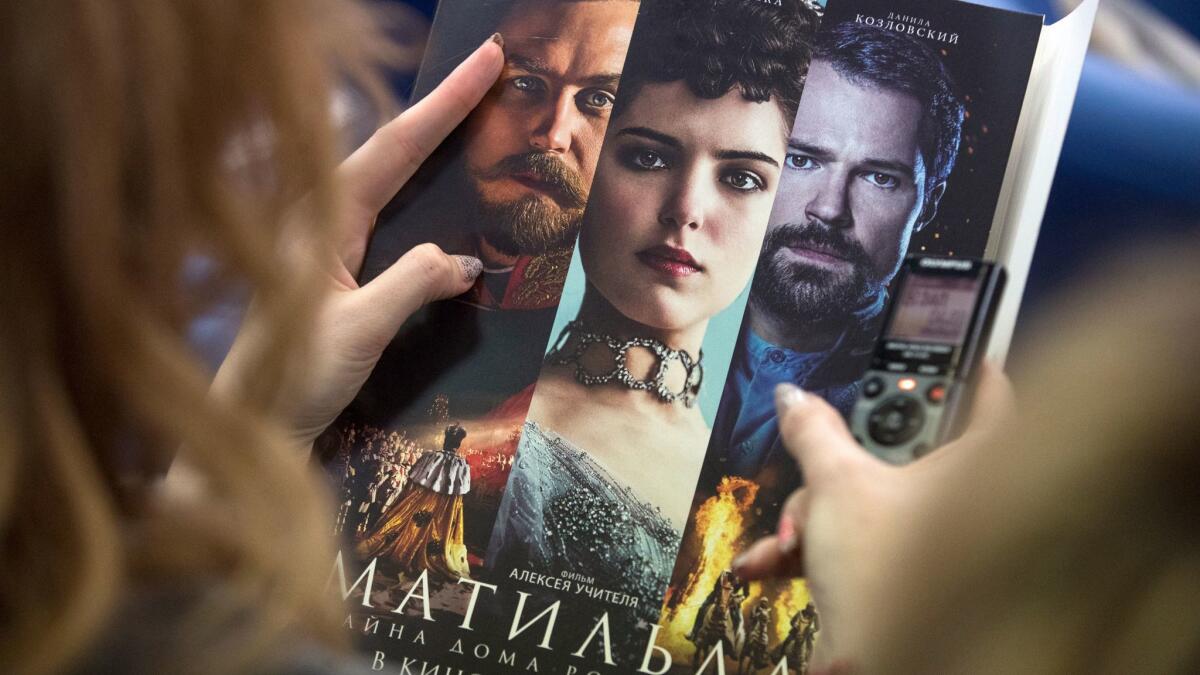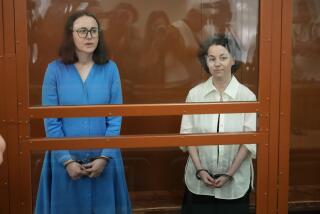A movie about a czar’s love affair ignites violent protest from Russia’s religious right

Violent attacks by radical Orthodox activists against theaters in Russia threaten the release of a film about a love affair between Russian Czar Nicholas II and a young ballerina. (Sept. 29, 2017) (Sign up for our free video newsletter here http://b
- Share via
Reporting from St. Petersburg — Alexei Uchitel sits in the elegant lobby cafe of the historic Hotel Astoria in St. Petersburg and answers an endless stream of phone calls about his new film, “Matilda.”
The film depicts the true story of a love affair between the future Czar Nicholas II and a young ballerina, Matilda Kshesinskaya, in St. Petersburg’s famed Mariinsky Theatre. The film’s official release is Oct. 26, but erotic scenes shown in trailers have enraged religious conservatives in Russia, who call the film blasphemous for depicting Nicholas in love scenes with the teenage ballerina.
The movie’s storyline has sparked a debate in Russia between those who support a conservative lawmaker’s call for a ban of the film on grounds it insults the faithful, and those who believe the Kremlin’s support for a revival of religious beliefs and the promotion of traditional values is stifling modern Russia’s creative class.
That debate turned violent this year, when a religious radical group called the Christian State-Holy Rus wrote letters in January to movie theaters across the country threatening to burn them down if they screened “Matilda.”
A series of arson attacks followed. In August, a Molotov cocktail was tossed into the film studio where Uchitel works in St. Petersburg. A few weeks later, cars parked on the Moscow street in front of Uchitel’s lawyer’s office were torched. Leaflets reading “Burn for Matilda” were left scattered at the scene.
In Yekaterinburg on the edge of the Ural Mountains, two men tried to drive a truck loaded with gas canisters into the front door of the Cosmos movie theater, which was scheduled to screen an early release of “Matilda.” The attack failed, but the whole event was captured on security cameras, and the driver of the truck was arrested.

The attempt in Yekaterinburg was significant for another reason: Czar Nicholas II and his family were killed there in 1918. The Russian Orthodox Church canonized them in 2000 — and conservative Orthodox believers oppose the depiction of a saint engaged in sex on screen.
Now, as Uchitel sipped a cappuccino at the Hotel Astoria on a late September afternoon, he was trying to convince the director of a St. Petersburg film exposition to go ahead with a buffet reception planned after “Matilda’s” scheduled debut the next day.
“No, don’t cancel it,” the director said with an exasperated sigh before hanging up.
Two of Russia’s biggest national movie theater chains announced this month that they would not screen “Matilda.” A film festival in the Siberian city of Chita in September said it would not allow “Matilda” to enter the event because of fears for the audience’s safety.
“Everyone is afraid,” Uchitel said after he had hung up with the film expo director. “The film had not been officially banned, but still, they are afraid. To me, that’s what is worrying about this whole ordeal.”
The controversy over “Matilda” is reminiscent of the uproar that surrounded American director Martin Scorsese’s film “The Last Temptation of Christ” in 1988. Religious organizations, including the Roman Catholic Church in the U.S., condemned the movie, which included a dream sequence of Jesus making love to Mary Magdalene. Movie theaters were picketed and vandalized, and an arson attack on a theater in Paris injured 13 moviegoers.
“Matilda” was originally scheduled to be released in March but has had only one early screening in Vladivostok, in Russia’s Far East, on Sept. 12. Police performed a sweep after a bomb threat was called in before the film started. Tickets for the screening sold out in 40 minutes, Uchitel said.
This isn’t the sort of attention Uchitel, a Golden Globe-nominated director, wanted for the release of his epic, $25-million film. “Matilda” was to be a new kind of Russian movie, with lavish sets and sophisticated costumes — 7,000 in total — that are common in Hollywood productions but rarely affordable in Russia. Most Russian films have a budget of about $2 million to $3 million, Uchitel said.
“Matilda” received funding from the Russian Ministry of Culture, which put up a third of the film’s budget. The ministry regularly contributes to Russian filmmaking.
Uchitel himself said he was drawn to the film’s subject not for the romantic aspect of the czar’s story, but for the choices he had to make as a man.
“He was presented with two choices: Either it was freedom, love and life with a person who was close and dear to him, or it was responsibility, and the state he would have to govern and take responsibility. And he chose the latter,” Uchitel said. “It’s a very sincere and passionate story, which in my opinion, influenced the future of our country. So back then, once again in my view, it was decided in what country we would live today.”
Under President Vladimir Putin, Russia has seen a religious revival, largely focused on the Orthodox Church, which critics say the Kremlin is using as a way to define Russian identity. Putin’s focus on Russian Orthodoxy turned political in 2012, after anti-government, pro-democracy protests erupted and threatened his grip on power. That year, Putin warned of Russia’s deterioration if the country did not adhere to “traditional values” that are distinctly different from Western liberalism.
An ultraconservative Russian lawmaker is leading the charge against Uchitel’s film. Natalia Poklonskaya, a member of Putin’s United Russia party, has called for a government ban on the film and said Uchitel should be prosecuted for insulting Orthodox believers.
She denies influencing the radical religious groups calling for arson attacks against the theaters, and she insisted in a parliamentary hearing this week that Orthodox extremism does not exist in Russia.
When police this month arrested the leader of the Christian State-Holy Rus group, Alexander Kalinin, in connection with the arson attacks and threats to movie theaters, Poklonskaya said the arrest was made on her order.
Poklonskaya, who made a name for herself as the general prosecutor in Crimea at the time of Russia’s annexation of the peninsula in 2014, has refused to see the film, despite Uchitel’s offering of a private screening.
“In the Soviet times, when I filmed documentaries, there was censorship,” said Uchitel, 66. “But the authorities at least watched our movies and told us what was wrong. They at least saw what they were talking about.”
What is happening now with “Matilda” looks more like demagoguery, he said.
Other responses from the government have been mixed. Dmitry Peskov, Putin’s spokesman, has denounced the violent attacks and threats from the religious activists as extremism, but he stopped short of blaming Poklonskaya for initiating the movement.
Putin, during an annual June call-in session with the public, was asked by a Russian actor in the audience to comment on the controversy surrounding the film. The Kremlin leader responded by saying that Poklonskaya had the right to her own point of view but that no one was banning the film.
“I urge everyone to have a dialogue within the framework of decency and, most importantly, within the law,” Putin said.
That might seem to have put the matter to rest. “But,” said Uchitel, “even he wasn’t listened to in this instance … or so it seems.”
The Russian Orthodox Church itself has condemned the violence but said Russia’s creative class should act with “tact and respect” in its work.
Vladimir Medinsky, the Russian minister of culture, asked police to ensure safe screenings of “Matilda” and criticized Poklonskaya for creating the scandal around the film.
“I don’t know what motivations are guiding the respected Mrs. Poklonskaya for starting and supporting this hubbub,” he said in a statement. “Maybe it’s from a pure heart. But, I am not ready to guess the motives of activist arsonists who vehemently call themselves Orthodox Christians.”
Uchitel said he thinks the threats against the film have gotten out of control, despite words of assurance from government officials. He sees continuation of a trend of religious fanaticism overshadowing reality in the Russian arts, he said.
“I think ‘Matilda’ is not the issue and neither am I, and the problem is more serious,” Uchitel said. “ ‘Matilda’ won’t be the end to this. There will be another movie, another play, another exhibition, whatever…. A naked statue could appear and they will be shouting that this is against Orthodoxy.”
“This is scary, and it can’t be allowed,” he said as he sat back in a plush velvet chair and looked down at his cellphone, which started ringing again.
Twitter: @sabraayres
Ayres is a special correspondent.
ALSO
The enemies are fake, but Russia’s war games are real. So is the alarm
The return of the far right in Germany: What does the rise of the AfD party mean?
Revered Russian theater director placed under house arrest, raising fears of a crackdown on dissent
More to Read
Sign up for Essential California
The most important California stories and recommendations in your inbox every morning.
You may occasionally receive promotional content from the Los Angeles Times.











